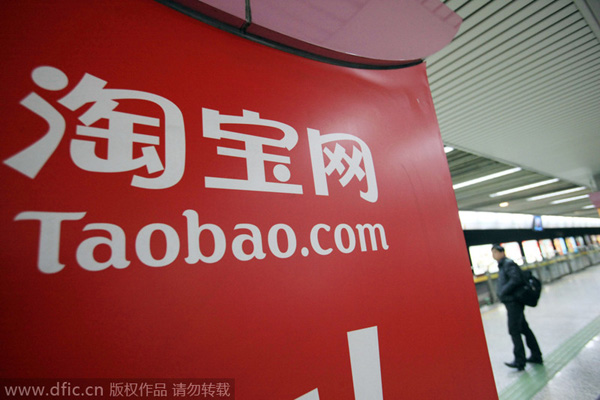Alibaba vows to carry on fake goods crackdown
 |
|
An advertisement for online shopping site Taobao.com of Alibaba Group is seen at a metro station in Shanghai, Nov 12, 2014. [Photo/IC] |
E-commerce giant Alibaba has publicized its record in working with police on cracking down on online stores that make, supply and sell fake products.
It said a recent case in Putian, Fujian province, saw information from Alibaba Group help police find and destroy four workshops that had been used in the production of fake sports shoes that were sold online as if they were genuine brands, including Nike and Adidas.
The leading e-commerce enterprise has now reached a cooperation agreement with the public security bureau in Putian aimed at fighting against counterfeit products in the fields of food, medicine, shoes, clothes and home appliances, said a statement from the company that was released on Tuesday.
Alibaba said it will share information about fake goods being sold online and help police in their investigations.
The company said it wants to protect customers from fakes and has been studying data since 2010 in an attempt to develop technology that can help.
Chen Liang, an officer with the company who is responsible for the protection of intellectual property rights, said: "We can locate these workshops that we suspect of making and selling fake goods by analyzing their online logistics routes and then inform police officers to investigate."
The company has not disclosed additional detail about how the team operates but the statement said more than 2,000 people have joined the company's special team tackling counterfeit goods, with 300 core members including professionals in criminal investigation and information analysis.
The company said more than 10,000 online stores and some international brands have signed up to participate.
A report issued by the company in April included a map locating 3,518 gangs that were allegedly selling fake goods.
Alibaba said its team has already helped police at home and abroad crack down on cross-border gangs allegedly making, supplying and selling products under the name of fashion brands, such as Louis Vuitton.
On Sept 14, police in the Baiyu district of Guangdong province broke up four such gangs and arrested a man they believed to be a ringleader, as well as seven alleged accomplices.
Thanks to the company's information, police found several workshops in Guangdong and Dubai.
"They had a clear division of work," the company's statement said. "Some took charge of providing leather materials, while some were responsible for the online purchases."
Acting on information from Chinese police, two suspects who had allegedly been selling fake LV products were detained and more than 6,000 fake goods confiscated in Dubai, it added.
Despite the company's efforts, it was suspended by the International Anti-Counterfeiting Coalition on Friday, only a month after it become the first e-commerce member of the nonprofit global organization.
The suspension was publicized after questions were raised about conflicts of interest involving the organization and complaints from some members, who said Alibaba was a place for cheap counterfeits.
But the company said on Sunday its suspension will not influence its relations and cooperation with the organization and it said it will continue to crack down on the selling of fake goods.



 Print
Print Mail
Mail

